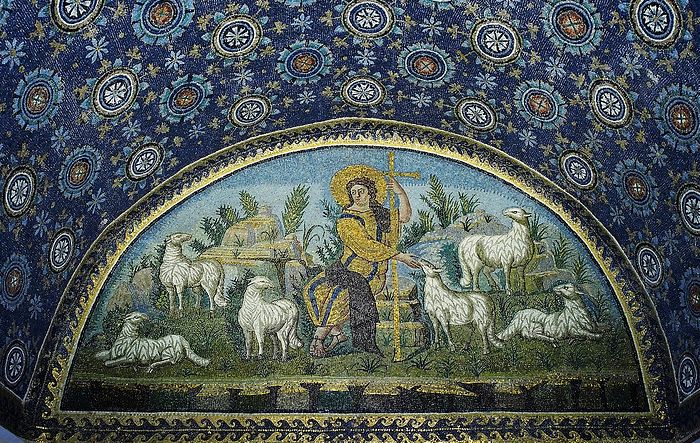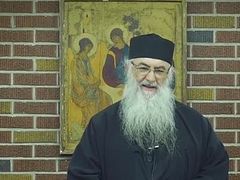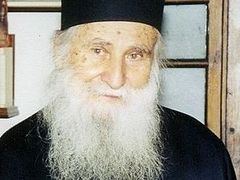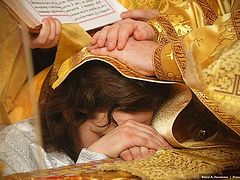God granted bishops to the Church as the head of the body and as one who continues the work of the apostles. As a representative of Jesus Christ, a bishop ought to be illumined by the grace of truth that is granted him during his consecration in order to lead the faithful to this same grace, which grants eternal salvation in Jesus Christ.
The greatest and most important event that takes place during the consecration of a bishop is not his sermon, or his promises, or the multitude of his aspirations, but rather the glorious confession, before God and the Church, of all Orthodox dogmas. The bishop promises to be faithful to the faith, to reject the heresies that the Ecumenical Councils had rejected, and to preserve the holy canons. Based on this holy confession, the bishop receives the greatest level of grace, which is the fullness of the gift of the Holy Spirit.
Every grace that the bishop receives, he receives primarily because he is an Orthodox bishop and because his Orthodox faith is true. He does not receive grace because his works are glorious, his thoughts are good, and his testimonies are great. However, the grace of the Holy Spirit is withdrawn from the bishop simply if he relaxes in keeping the holy Orthodox faith. Relaxation in keeping the faith does not necessarily mean not believing in the dogmas of the Church. Relaxing could simply mean that, in addition to the true faith, the bishop accepts another faith that contradicts Orthodox dogmas. Accepting an additional contradictory faith is considered a sin. According to the Ecumenical Councils, faith in Orthodox dogmas means the total and strict rejection of all other contradictory faiths. The withdrawal of the grace of the Holy Spirit does not have to be immediate, but could be delayed because God affords the bishop an opportunity to see his own deviation and to repent.
We see in the Holy Bible, through His teachings to the disciples, who were the first bishops, that the subject of bishops was important to Christ Himself. After Christ, St. Paul speaks in his Epistles about the practical and pastoral roles of the bishop; such roles have served the Church throughout history. St. Paul writes that the bishop should adorn himself with lofty virtues, some of which are related to the Church and others related to the bishop personally. As to his responsibility to the Church, St. Paul requires from the bishop, among many other virtues, to be sober and apt to teach (1Timothy 3:2). In his explanation of the Epistle to Timothy, St. John Chrysostom defines the meaning of being “sober,” saying that the bishop ought to have clear vision, be vigilant, watchful over the flock of Christ, sharp in his mind, and caring for all.
According to the Golden Mouth,1 this soberness, watchfulness, and vigilance that the apostle requires are primarily for the benefit of the faith of the flock of Christ. Soberness demands of the bishop, as the first who was given the gift of truth, to rightly define the word of truth for the flock in matters of the faith. In this evil time, during which the holy faith, together with our Sacraments, has been squandered, how ought the bishop to protect his people from the effects of this world and this evil age? Did not God choose the bishop to be a prophet to, and a teacher of His people? Who is to feed the people when they hunger for the word of truth? In this age of globalization that makes everything worldly, and in this time of corrupt ecumenical dialogues that kills every Divine truth, who can warn the faithful about the wolves in sheep’s clothing? Who ought to reveal to the faithful the signs of the times? Who should discern for the people whether the spirits, whose influence increases in the world, are from God or from the Devil? Did not the Evangelist exhort: Beloved, do not believe every spirit, but test the spirits to see whether they are of God, then continuing, explaining why: for many false prophets have gone out into the world (1 Jn. 4:1)?
Are not the innovations, the heresies, and the globalization of the Orthodox faith that the new ecumenism imposes, among the spirits that the prophets of the Devil propagate in this world? We find ourselves in a time when the Church has gone to sleep and its bishops no longer want to test the spirits. Who then can discern the spirits for the people, if the bishop himself has surrendered himself to one of these lying spirits and has become a murderer of the truth?
The bishop who does not have a strong sense of Orthodox beliefs has nothing good to offer the Church. The bishop who does not care for the dogmas of the Church destroys the foundations of the Christian faith. Outside the dogmas, the path of the Church is automatically transformed from seeking to know Jesus Christ and seeking His Kingdom to being simply satisfied to emphasize the ideal morals, which outwardly seem beneficial to society; but its core remains limited by the boundaries of the fallen world, limited by this era that is destroyed by sin and in opposition to God. We achieve the Kingdom of God by faith alone. Of course, in Orthodoxy faith is affirmed by works of love. This living faith of which we speak is the faith that is based on the doctrines of the holy Church because purely rational faith in God does not exist. Faith is considered true faith when it is based on solid doctrinal foundations.
In this age of doctrinal indifferences, and the spiritual indifferences that arise from it, how can you recognize that a bishop has fallen and has become part of the spirit of this world? The answer is when you see a bishop contradicting and breaking the canons, particularly the ones relating to the dogmas of the faith. A bishop has fallen when he considers the holy doctrines as theoretical matters that are not related to salvation. When a bishop considers the ecumenical and local canons, which the Church accepted in her living conscience, to be no more than obsolete laws set for their own age and that these laws should evolve to fit our present age, then you know that the bishop has become part of the spirit of this world. And if the bishop considers himself to be father and teacher of the Church equal to all the other Holy Fathers who spilled their blood to protect and keep the faith, the doctrines, and the canons of the Church, while at the same time he contradicts their teachings and mocks the struggles they suffered for the sake of the faith—surprisingly, that bishop denigrates the thinking and teachings of the Holy Fathers on the one hand, and on the other he celebrates their memory and preaches proudly about them. The Pharisees and hypocrites behaved in exactly the same manner. They both killed the prophets and wished they lived in their time.
What distinguishes a bishop from the faithful is that he should be a solid teacher of the faith and an interpreter of Divine doctrines. This was the exhortation of St. Paul to Bishop Titus: He must hold firm to the sure word as taught, so that he may be able to give instruction in sound doctrine and also to confute those who contradict it (Titus 1:9).
A bishop’s great virtue is that he sanctifies the faithful with the Sacraments, but sanctifies those who have been illumined with Divine truth. Before he baptizes by water, he baptizes by the Spirit and the word of Truth.
This is a bishop in Orthodoxy; this is his status and his importance in the Church. The flock rises and falls with him; with the bishop you learn the truth and are set free, or with him you become enslaved to the delusions of the devil, who is the enemy of the truth. With the bishop you are saved, or you are condemned. Rather, the bishop will be judged for all things.





